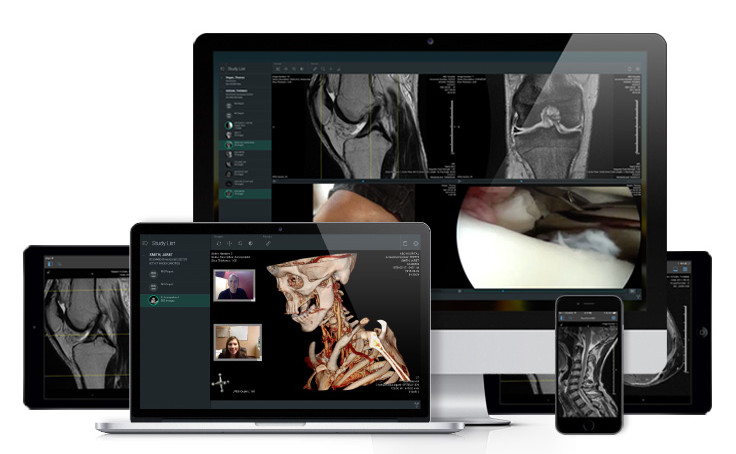ResolutionMD opens up mobile image access at Mayo Clinic
Since 2013, Mayo Clinic has provided its radiologists with the ability to view images from mobile devices using ResolutionMD® running on tablets and smartphones. Using ResolutionMD, radiologists, surgeons, neurologists, oncologists, and gastroenterologists across the clinic’s campuses in Arizona, Florida and Minnesota can access patient image data anywhere, anytime.

Josh Nash, Calgary Scientific May 9, 2017
“We have even had a radiologist on an airplane connect to Wi-Fi and render a second opinion using ResolutionMD. Mobile imaging is breaking down a lot of physical barriers to get an opinion or diagnosis rapidly,” says Amy Hara, MD, Professor of Radiology, for the Mayo Clinic.
ResolutionMD’s integrated video collaboration tools support telehealth, enabling Mayo physicians to co-ordinate care with providers in remote locations.
“With ResolutionMD, both physicians and radiologists can interact with images simultaneously, allowing them to collaborate in real-time. It’s a much more efficient and accurate form of communication when you’re not in the same location,” continues Hara.
| HIMSS Analytics Reveals 80 Percent of Providers Use Mobile Devices for Patient Care |
While Mayo Clinic is already realizing the benefits of mobile health IT, other providers are starting to catch the wave and put mobile devices to use in clinical settings, reports a new study from HIMSS Analytics. According to the study, 80 percent of providers now use tablets and over 40 percent use smartphones to provide and coordinate clinical care. Earlier studies have shown similar rates of mobile adoption, but providers’ surveyed in those studies said they primarily used their devices to access non-clinical data such as drug information, medical research and continuing education.
“This study identifies key areas where mobile technology can be most beneficial to providers. For example, access to data is huge – and this is true for both patients and organizational stakeholders. Hospitals can leverage mobile devices to access patient data across care settings,” explains Brendan FitzGerald, director of research at HIMSS Analytics.

| Barriers to Mobile Device Are Falling But Providers Still Seek Innovation |
The expanding mobile adoption in clinical settings indicates that hospitals and health systems are overcoming barriers to smartphone and tablet use, which include security, data access and communications integration. Another recent study shows that the number of healthcare organizations with formal mobile enterprise strategies doubled between 2012 and 2016. Clinical input into these strategies also increased during this same time to ensure that providers’ workflow requirements are supported.
However, despite health organizations’ work to build enterprise mobility strategies, providers still seek innovation to make mobile workflows more efficient. The HIMSS study asked participants, “What would you like to see in the future to provide and coordinate patient care and improve outcomes through the use of smartphone/tablet mobile technology?”
In response, surveyed providers were “loud and clear” about the need for integrated security. Providers want to use mobile devices to share and access patient data and images within their organizations without concerns about safety and security. Those surveyed for the study also noted that the ability to coordinate data between departments and hospitals in real time was high on their list of mobile data access needs.
ResolutionMD was designed from the ground up to meet these needs. It includes all the features providers want to integrate mobile patient care into their workflows, such as built-in security and collaborative communications. It also remains one of the only mobile medical applications that has FDA Class II accreditation for viewing and diagnosis via mobile devices and over the web, in the US and around the globe. ResolutionMD transforms clinicians’ mobile devices into a universal image viewer and an FDA cleared medical diagnostic tool.
Source Calgary Scientific
